英语七年级下册Unit 2 What time do you go to school?单词及知识点讲解课件(共有PPT16张)
文档属性
| 名称 | 英语七年级下册Unit 2 What time do you go to school?单词及知识点讲解课件(共有PPT16张) |  | |
| 格式 | zip | ||
| 文件大小 | 2.0MB | ||
| 资源类型 | 教案 | ||
| 版本资源 | 人教新目标(Go for it)版 | ||
| 科目 | 英语 | ||
| 更新时间 | 2022-01-25 21:16:36 | ||
图片预览

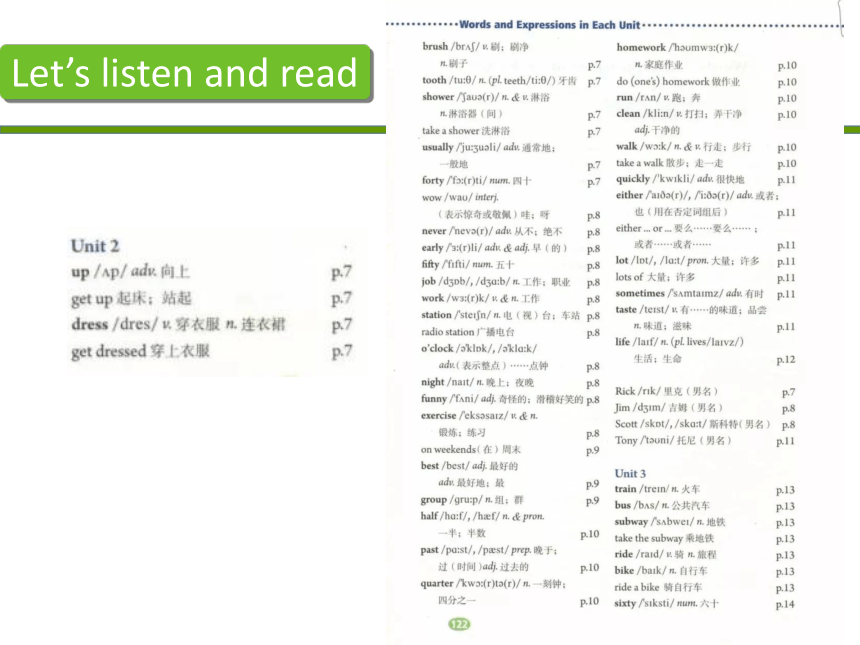
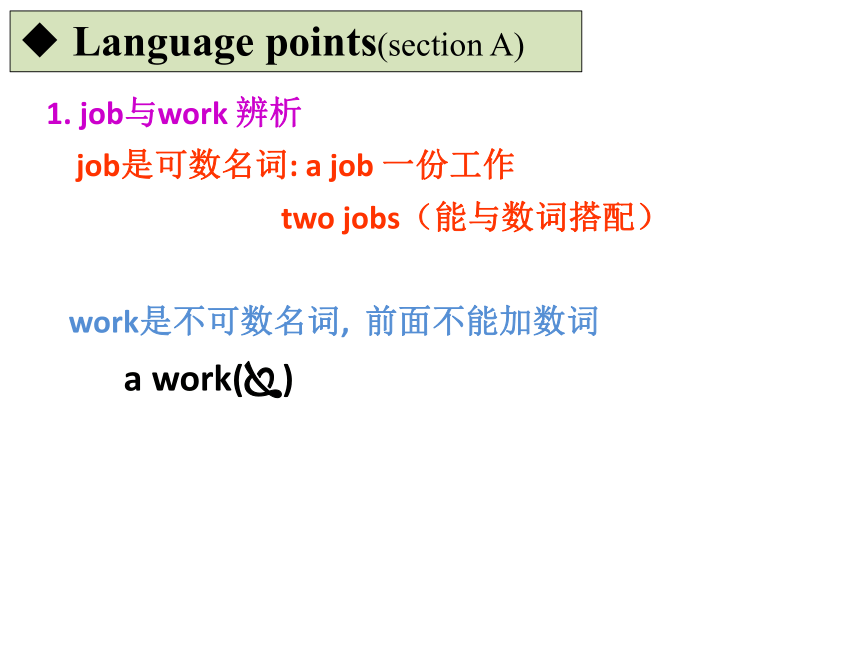
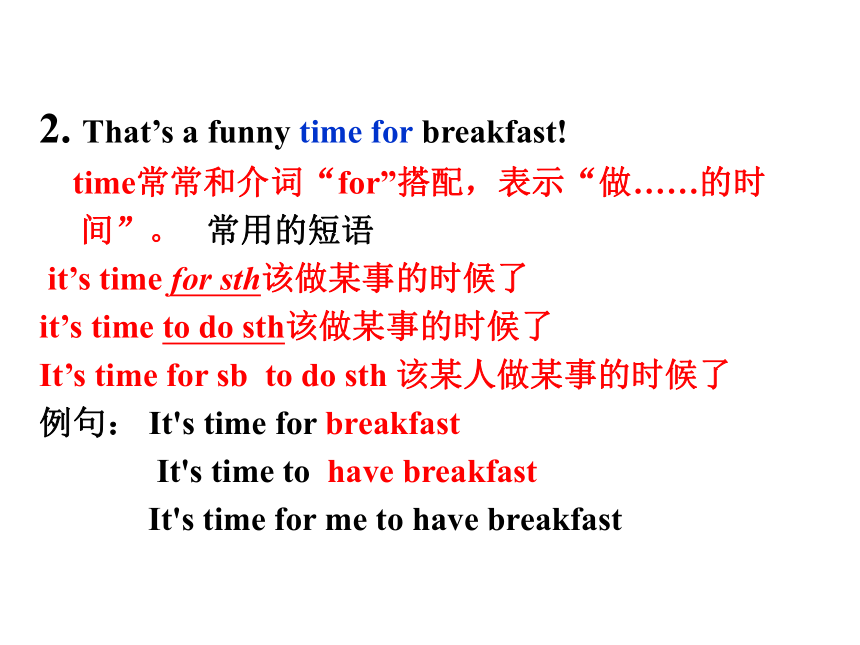
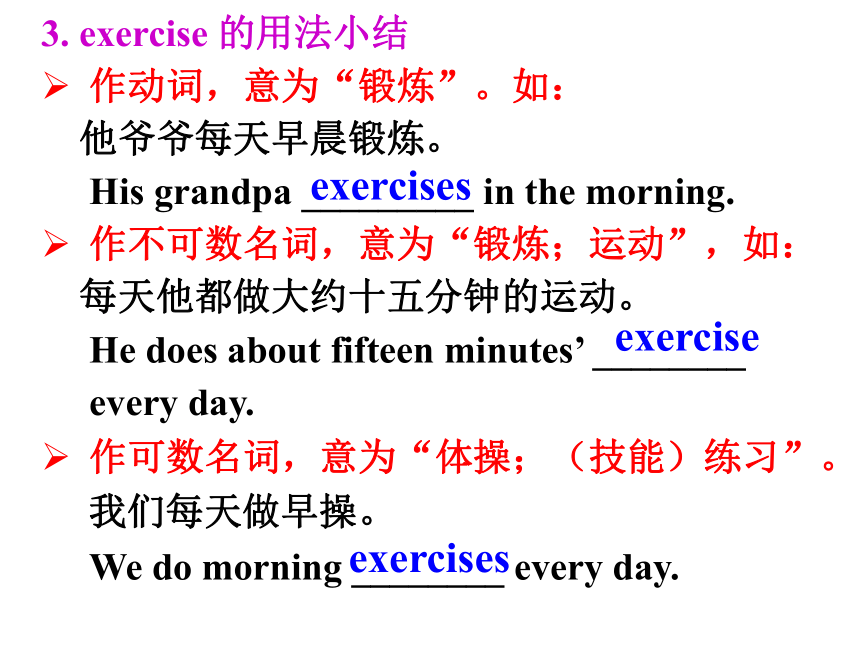
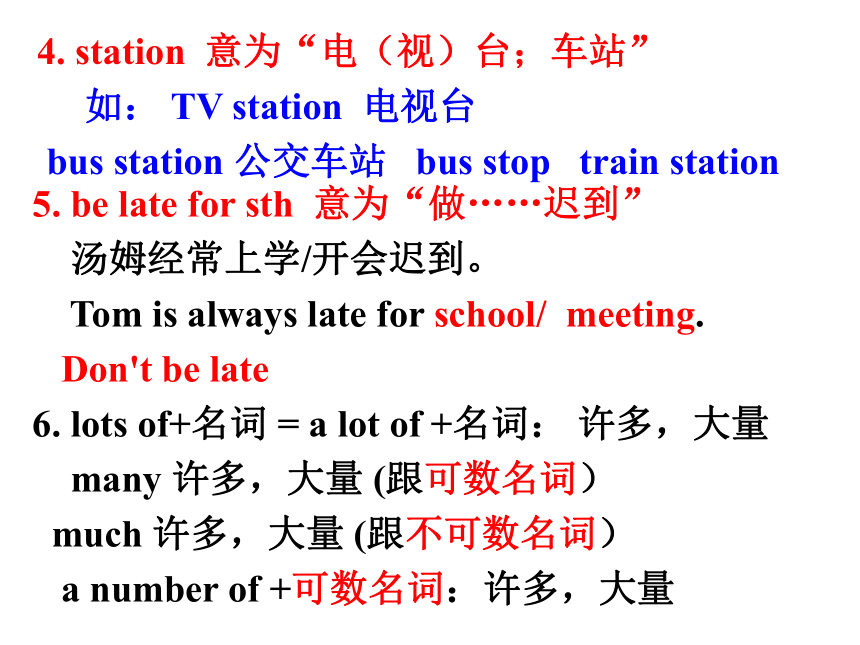
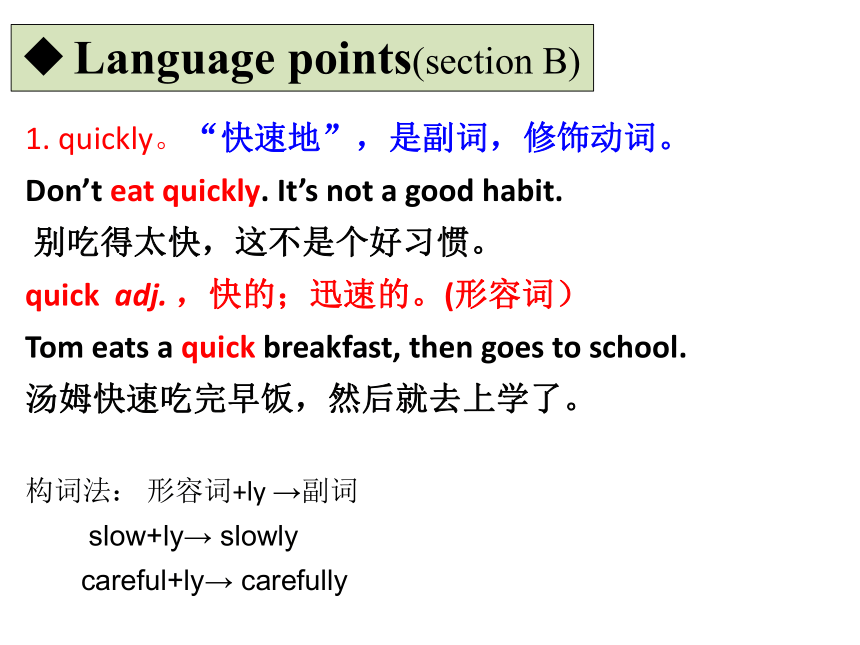
文档简介
(共16张PPT)
What time do you go to school
Unit 2
第一课时 单词
Let’s listen and read
1. job与work 辨析
job是可数名词: a job 一份工作
two jobs(能与数词搭配)
work是不可数名词, 前面不能加数词
a work( )
Language points(section A)
2. That’s a funny time for breakfast!
time常常和介词“for”搭配,表示“做……的时间”。 常用的短语
it’s time for sth该做某事的时候了
it’s time to do sth该做某事的时候了
It’s time for sb to do sth 该某人做某事的时候了
例句: It's time for breakfast
It's time to have breakfast
It's time for me to have breakfast
3. exercise 的用法小结
作动词,意为“锻炼”。如:
他爷爷每天早晨锻炼。
His grandpa _________ in the morning.
作不可数名词,意为“锻炼;运动”,如:
每天他都做大约十五分钟的运动。
He does about fifteen minutes’ ________ every day.
作可数名词,意为“体操;(技能)练习”。
我们每天做早操。
We do morning ________ every day.
exercises
exercise
exercises
5. be late for sth 意为“做……迟到”
汤姆经常上学/开会迟到。
Tom is always late for school/ meeting.
Don't be late
6. lots of+名词 = a lot of +名词: 许多,大量
many 许多,大量 (跟可数名词)
much 许多,大量 (跟不可数名词)
a number of +可数名词:许多,大量
4. station 意为“电(视)台;车站”
如: TV station 电视台
bus station 公交车站 bus stop train station
1. quickly。“快速地”,是副词,修饰动词。
Don’t eat quickly. It’s not a good habit.
别吃得太快,这不是个好习惯。
quick adj. ,快的;迅速的。(形容词)
Tom eats a quick breakfast, then goes to school.
汤姆快速吃完早饭,然后就去上学了。
构词法: 形容词+ly →副词
slow+ly→ slowly
careful+ly→ carefully
Language points(section B)
Jack eats either hamburgers or sandwiches for lunch.
杰克或者吃汉堡或者吃三明治作午饭。
You can either play chess or play the guitar.
你可以下棋或者弹吉它。
当either…or…连接主语时,谓语动词的时态和数应与最近的一个相匹配(就近原则)。
Either you or he is right.
不是你对就是他对
2. either… or… 意为“或者……或者…… ”连词,用来 连接两个并列名词、代词或句子。
3. She knows it’s not good for her, but it tastes good!
1) be good for …表示“对……有益;对……有好处”;
be bad for…表示“对……有害;对……有坏处”。
It’s good for our health to go to bed early and get up early.
早睡早起对我们的健康有好处。
Don’t read in the dark. It’s bad for your eyes.
不要在暗处看书,这对你的眼睛有害。
Does the ice-cream taste nice
冰淇淋的味道尝起来很好吗?
4. taste
①“品尝 起来…。是感观动词,后面常跟形容词。
②作名词,意为“味道”。
The ice-cream has a taste of lemon.
冰淇淋有点柠檬的味道。
五个感观动词: look, sound, smell , taste, feel. 感观动词后跟形容词
6. group 组,群 a group of 一组,一群
We have six students in our group.(in the group)
我们小组里有六名学生。
7. on school days / on school nights在上学日里
on weekends=on the weekend 在周末
5. best 最好的(地)
good/well --better(更好的/地)---best
My good friend is Jack, and he’s my best friend.
杰克是我的好朋友, 且他是我的最好的朋友。
8. take a shower ; take a walk
take a/an+名词
have a/an+ 名词
take a walk =have a walk
take a shower= have a shower
9. a quarter: 四分之一
three quarters 四分之三
10.频率副词
always 总是, often 经常, usuall y 通常,
sometimes有时, seldom 几乎不
hardly ever 几乎不,很少, never 从不
get up
get dressed
brush teeth
eat breakfast
go to school
take a shower
Let’s learn
run
walk
go to bed
do homework
clean the room
take a walk
Exercises:
5:00--
6:00--
7:40--
8:00--
9:02--
10:20--
11:35--
time______
什么时候_______
短语:通常_______
去上学__________
起床____________
淋浴;洗澡__________
吃早饭____________
刷牙_____________
几点
when
usually
go to school
get up
eat breakfast
five o'clock
take a shower
brush teeth
six o'clock
seven forty
eight o'clock
nine two
ten twenty
eleven thirty-five
根据图片提示填空
1.I at six thirty.
2.I get dressed .
3.I at seven twenty in the morning.
4.I at about seven ten.
get up
at six forty
eat/have breakfast
go to school
What time do you go to school
Unit 2
第一课时 单词
Let’s listen and read
1. job与work 辨析
job是可数名词: a job 一份工作
two jobs(能与数词搭配)
work是不可数名词, 前面不能加数词
a work( )
Language points(section A)
2. That’s a funny time for breakfast!
time常常和介词“for”搭配,表示“做……的时间”。 常用的短语
it’s time for sth该做某事的时候了
it’s time to do sth该做某事的时候了
It’s time for sb to do sth 该某人做某事的时候了
例句: It's time for breakfast
It's time to have breakfast
It's time for me to have breakfast
3. exercise 的用法小结
作动词,意为“锻炼”。如:
他爷爷每天早晨锻炼。
His grandpa _________ in the morning.
作不可数名词,意为“锻炼;运动”,如:
每天他都做大约十五分钟的运动。
He does about fifteen minutes’ ________ every day.
作可数名词,意为“体操;(技能)练习”。
我们每天做早操。
We do morning ________ every day.
exercises
exercise
exercises
5. be late for sth 意为“做……迟到”
汤姆经常上学/开会迟到。
Tom is always late for school/ meeting.
Don't be late
6. lots of+名词 = a lot of +名词: 许多,大量
many 许多,大量 (跟可数名词)
much 许多,大量 (跟不可数名词)
a number of +可数名词:许多,大量
4. station 意为“电(视)台;车站”
如: TV station 电视台
bus station 公交车站 bus stop train station
1. quickly。“快速地”,是副词,修饰动词。
Don’t eat quickly. It’s not a good habit.
别吃得太快,这不是个好习惯。
quick adj. ,快的;迅速的。(形容词)
Tom eats a quick breakfast, then goes to school.
汤姆快速吃完早饭,然后就去上学了。
构词法: 形容词+ly →副词
slow+ly→ slowly
careful+ly→ carefully
Language points(section B)
Jack eats either hamburgers or sandwiches for lunch.
杰克或者吃汉堡或者吃三明治作午饭。
You can either play chess or play the guitar.
你可以下棋或者弹吉它。
当either…or…连接主语时,谓语动词的时态和数应与最近的一个相匹配(就近原则)。
Either you or he is right.
不是你对就是他对
2. either… or… 意为“或者……或者…… ”连词,用来 连接两个并列名词、代词或句子。
3. She knows it’s not good for her, but it tastes good!
1) be good for …表示“对……有益;对……有好处”;
be bad for…表示“对……有害;对……有坏处”。
It’s good for our health to go to bed early and get up early.
早睡早起对我们的健康有好处。
Don’t read in the dark. It’s bad for your eyes.
不要在暗处看书,这对你的眼睛有害。
Does the ice-cream taste nice
冰淇淋的味道尝起来很好吗?
4. taste
①“品尝 起来…。是感观动词,后面常跟形容词。
②作名词,意为“味道”。
The ice-cream has a taste of lemon.
冰淇淋有点柠檬的味道。
五个感观动词: look, sound, smell , taste, feel. 感观动词后跟形容词
6. group 组,群 a group of 一组,一群
We have six students in our group.(in the group)
我们小组里有六名学生。
7. on school days / on school nights在上学日里
on weekends=on the weekend 在周末
5. best 最好的(地)
good/well --better(更好的/地)---best
My good friend is Jack, and he’s my best friend.
杰克是我的好朋友, 且他是我的最好的朋友。
8. take a shower ; take a walk
take a/an+名词
have a/an+ 名词
take a walk =have a walk
take a shower= have a shower
9. a quarter: 四分之一
three quarters 四分之三
10.频率副词
always 总是, often 经常, usuall y 通常,
sometimes有时, seldom 几乎不
hardly ever 几乎不,很少, never 从不
get up
get dressed
brush teeth
eat breakfast
go to school
take a shower
Let’s learn
run
walk
go to bed
do homework
clean the room
take a walk
Exercises:
5:00--
6:00--
7:40--
8:00--
9:02--
10:20--
11:35--
time______
什么时候_______
短语:通常_______
去上学__________
起床____________
淋浴;洗澡__________
吃早饭____________
刷牙_____________
几点
when
usually
go to school
get up
eat breakfast
five o'clock
take a shower
brush teeth
six o'clock
seven forty
eight o'clock
nine two
ten twenty
eleven thirty-five
根据图片提示填空
1.I at six thirty.
2.I get dressed .
3.I at seven twenty in the morning.
4.I at about seven ten.
get up
at six forty
eat/have breakfast
go to school
同课章节目录
- Unit 1 Can you play the guitar?
- Section A
- Section B
- Unit 2 What time do you go to school?
- Section A
- Section B
- Unit 3 How do you get to school?
- Section A
- Section B
- Unit 4 Don't eat in class.
- Section A
- Section B
- Unit 5 Why do you like pandas?
- Section A
- Section B
- Unit 6 I'm watching TV.
- Section A
- Section B
- Review of Units 1-6
- Unit 7 It's raining!
- Section A
- Section B
- Unit 8 Is there a post office near here?
- Section A
- Section B
- Unit 9 What does he look like?
- Section A
- Section B
- Unit 10 I'd like some noodles.
- Section A
- Section B
- Unit 11 How was your school trip?
- Section A
- Section B
- Unit 12 What did you do last weekend?
- Section A
- Section B
